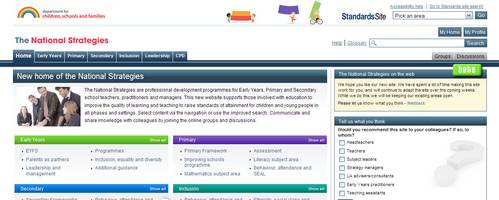
Hooray for another high-profile UK government website based on an open source content management system: the new National Strategies website from DCSF, built on Drupal. It’s big, bright, bold, and once you’ve registered – a remarkably painless process for a government site, without any apparent checks on your membership of the target audience – it offers significant social functionality: commenting on articles, bookmarking pages to your own personal homepages, group discussion, page rating, sending links to Delicious and the like. Nothing exceptional for a Drupal site, perhaps, but pretty impressive for HMG.
There’s particular significance to this particular launch, though. The National Strategies, and much of this ‘2.0’ functionality, were due to be part of Schoolsweb, the ambitious plan to rationalise all schools-related sites into a single mega-portal, to be built on the same Stellent-based infrastructure as Directgov (known as ‘The Club’). It was initially scheduled to launch in late 2005, with eight-figure budgets quoted; the last public reference I’m aware of was in February 2008, when Jim Knight responded in a PQ: Work is currently being taken forward to bring these sites into a single new website for schools – ‘SchoolsWeb’. (Note the present tense.) And as I noted some time ago, the guys who did the visual design work for Schoolsweb are still quoting it in their online portfolio, with the caveat: ‘We are currently supporting the project through a challenging build phase pending the full launch of the website shortly.’
To paper over the cracks, a temporary signposting website was launched at www.schoolsweb.gov.uk, labelled ‘Schoolsweb Locate’ – but even that has been taken away now, replaced by a slightly clumsy redirect to the long-established ‘Standards Site’.
On this evidence, one would have to assume that Schoolsweb, as initially conceived at least, is dead. In its place, we have a feature-rich online community built on open-source tools, and making use of pre-existing functionality – either in its core platform, or via plugins. My understanding is that the Drupal site came together in a matter of months, and seems to offer most (if not all) the functionality envisaged for Schoolsweb.
Somewhere in there lies a great case study just waiting to be written.
